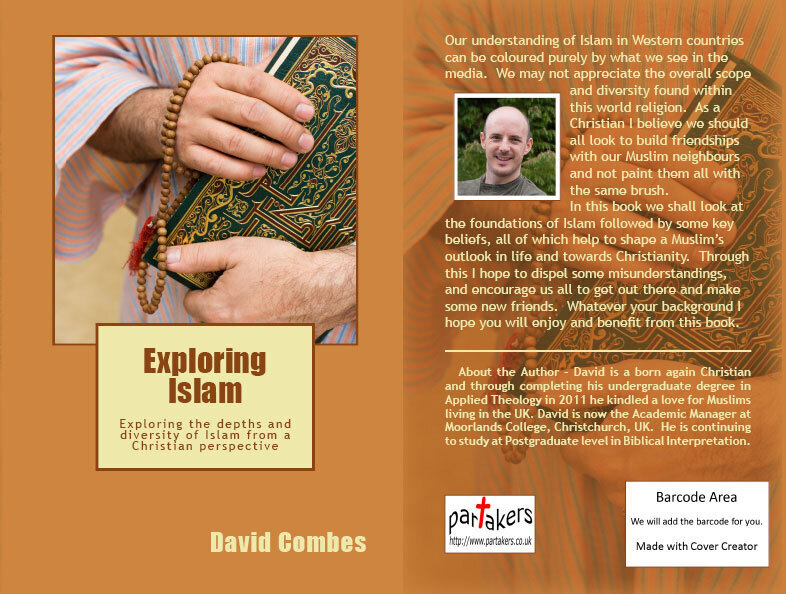
G’day and welcome to Partakers Christian Podcasts! Join us for uplifting Bible teaching, inspiring readings, heartfelt worship, powerful prayers, and fascinating church history. Whether you’re new to faith or growing deeper in your journey, we’re here to encourage and equip you. 🎧 Tune in, interact, and be inspired—wherever you are in the world.
Episodes

Thursday Apr 22, 2021
Exploring Islam 03
Thursday Apr 22, 2021
Thursday Apr 22, 2021

Exploring Islam
The Qur’an and Hadith
Muhammad’s miraculous sign as a prophet was not healing, or feeding of the five thousand, but instead the transmission of Allah’s message to the Arab people, the Qur’an. In this podcast we shall briefly look at this and the additional Islamic writings called the Hadith.
Origins and layout of the Qur’an
The Qur’an as we now read it, was not written and collated until after Muhammad’s death. Whilst he was proclaiming his message from Allah to the people it was common for scribes to write down what he said, but most Islamic scholars agree that this was not systematic. Unlike the Christian Bible which spans many years, cultures and authors, the material found in the Qur’an originated from one person within their twenty year ministry. The nature of the text is very poetic in content and structure so much so that many native Arabic speaking peoples consider it a higher form of the language, as well as an older and now disused dialect.
It is believed that Muhammad received the material for the Qur’an from Allah via His messenger the Angel Gabriel, otherwise known as the ‘the holy spirit’. These visions were intense affairs where the prophet was sometimes seen coming out of a trance like state. After his death it is no surprise that there was some diversity in the form and detail of some of the written records of Muhammad’s message. The third Caliph, or leader of Islam, Caliph Uthman appointed in 644AD twelve years after Muhammad’s death set out to collate and establish a single version of the prophet’s message which remains today. The overall layout of the Qur’an is somewhat different to that of the Christian Bible.
The Suras were ordered not chronologically but in size, the longest first running down to the shortest. The only exception is Sura 1 which is seen as a special opening prayer to the Qur’an. In a general sense this structure placed the later Suras, the ones received whilst Muhammad was living in Medina, first as they were the longest.
Most English translations of the Qur’an have opening comments to each Sura which briefly describe its timing. The Suras themselves are not specific to a particular topic or event, but contain within them a variety of different subjects and exhortations. It may start by talking about the role of women, then move onto accounts of Abraham, and perhaps finish discussing heaven or Paradise. This shift within the Sura makes for difficult reading if unfamiliar with the Qur’an, and the change from one topic to the next does not necessarily mean they should be connected via a general principle or lesson.
Unlike the Christian Bible which is believed to be unified in its truth and content, passages in the Qur’an can come under abrogation. A later passage regarding a particular situation or topic can supersede an earlier instruction. An example might be the growth over time in the number of wives a Muslim may have. As a Muslim this facet of the text is not viewed as a negative drawback but simply as the way Allah has chosen to communicate.
Authority of the Qur’an
Despite the origins of the Qur’an, the words within the book were considered by Muhammad and are still by Muslims to be the actual words of Allah. Even though they were transmitted through a human prophet they contain no reflection or influence by him. In fact, the message contained within the Qur’an originated according to Hadith from an eternal tablet located in heaven. This everlasting tablet of Allah’s words was the source of all the previous books from previous Islamic prophets, Moses and the Torah, David and the Psalms, Jesus and the Gospel. Therefore, the Qur’an itself is handled with great respect. Unlike the Christian Bible it ceases to be the Qur’an when it is translated out of the original Arabic into say English, hence these are typically called ‘The Meaning of the Glorious Qu’ran’. The Qur’an is never placed on the floor, never held below waist height when being carried, can never have anything placed on top of it, and is certainly never written in. All Muslims today consider their copy of the Qur’an to be one of their most precious possessions and as such any non-Muslim should display some level of respect even if they do not believe in its claims.
However, it is this authority stemming from its eternal origins which, in my opinion, poses some food for thought for Muslims. Anything eternal can only be equated to Allah, and therefore what exactly is this heavenly tablet? Many everyday Muslims may not have considered this question and if presented with it may react with offense. Caution and sensitivity is needed or else we risk raising only more barriers.
What about the Hadith?
Along with the Qur’an, what Muhammad said and did outside of the specific proclamations from his Angelic visions have been collated and are called the Hadith. As a political and religious leader he was faced with many different and challenging situations and questions from his followers which he sought to answer. These sayings were recorded either during his ministry or afterwards and form the backbone for what was subsequently structured as Sharia law, the overall structure and guidance for all aspects of Islamic life. Unlike the Qur’an there are today different Hadiths written by different Islamic scholars and have different providence.
The reliability of a Hadith is based upon the length and character of the witnesses who passed on the information before it was written down. Some which today are considered popular and reliable are authored by Bukhari, and separately by a scholar simply called Muslim. Many put a lot of unquestioned trust and authority into the teachings and principles found in the Hadith, sometimes equalling that given to the Qur’an. This is despite the orthodox position that it is only the Qur’an which can be considered the actual authoritative words of Allah. The status of Muhammad as the seal of all prophets has naturally led to this popular view of the Hadith, and many Muslims which I have met have raised the prophet, rightly or wrongly, onto the same ethical and moral pedestal as Christians do for Jesus. Next time we shall look at the different expressions of Islam found today characterised in the divide between Sunni and Shia, but also in Sufism and Folk Islam.
Right Mouse click or tap here to save this as an audio mp3 file

This now is available to buy as a book on Amazon :
UK/Europe - £5 - http://www.amazon.co.uk/Exploring-Islam-exploring-diversity-Christian/dp/1507774567/
USA - $7 - http://www.amazon.com/Exploring-Islam-exploring-diversity-Christian/dp/1507774567/
Click or tap on the appropriate link below to subscribe, share or download our iPhone App!![]()
![]()
![]()
![]()
![]()
![]()

No comments yet. Be the first to say something!